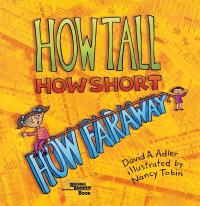Simple machines are all around us! They can be seen in a flag pole (a pulley), a faucet (a wheel and axle), and even on the playground (a seesaw is a lever!). Flat illustrations and an understandable narration introduce and explain three types of simple machines most of which are in a young reader’s experience.
Book lists this appears on
Themed Booklist
Summer Reading Guide 2015
Other books by this author

This introduction to the life and work of inventor, statesman and printer Benjamin Franklin is presented in straightforward text and detailed illustrations
A Picture Book Biography of Benjamin Franklin

The life of the first President of the United States, George Washington, is presented in uncomplicated language and meticulous illustrations.
A Picture Book Biography of George Washington

“The selfless struggles of labor leader Chavez are given a tempered and lucid treatment in this educational overview… The characters are drawn in an intentionally stiff style that fits with the depth-challenged folk art backgrounds, most of which are dominated by the color of sand. The text, meanwhile, is peppered with quotes from Chavez, all of which are backed up with source notes. An elegant introduction to a man who inspired thousands.”
— Daniel Kraus, Booklist
A Picture Book of Cesar Chavez

A portrait of a true American sports hero, Jackie Robinson, who was the first African American to play on a major league baseball team.
A Picture Book of Jackie Robinson

Jesse Owens was a breakthrough athlete – an African American who captured the world stage (and four gold medals!) at the 11th Olympiad in Nazi Germany. In this book, readers will learn about his life through brief text and watercolor illustrations. Younger readers may enjoy Patricia and Fredrick McKissack’s picture book, Jesse Owens: Olympic Star.
A Picture Book of Jesse Owens

When John and Abigail first met, they didn’t really like each other but came to appreciate the other’s strengths: Abigail had her own opinions; John was honest and witty. After their marriage, Abigail expertly handled home, family, and more during her husband’s frequent travel and was the earliest First Lady to live in the Executive Mansion. This is a graceful introduction to an early first family. View this exclusive digital version of Abigail and John
A Picture Book of John and Abigail Adams

The story of Louis Braille, the Frenchman who invented the raised-dot alphabet/code now used around the world by blind and visually impaired readers. The text traces Braille’s life from the childhood accident that caused him to lose his sight through his career at the National Institute for Blind Children in Paris. Readers can feel the alphabet and numbers from 1-10 at the back of the book.
A Picture Book of Louis Braille

Trudy Ederle loved to swim and was determined to be the best. Through hard work and determination she became the first woman to swim the English Channel.
America’s Champion Swimmer: Gertrude Ederle

Jeffrey Bones narrates this easy-to-read mystery that begins with his preparation for his grandfather’s birthday celebration, introduces a lost present, and ultimately moves to a satisfying resolution. New readers will appreciate the textual and visual clues which allow them to solve the mystery along with young Bones.
Bones and the Birthday Mystery

Cam Jansen’s photographic memory once again foils the bad guy as she helps catch the thief who snitches her grandparents’ luggage — along with birthday gifts for Cam’s parents — at the airport. There is a lot to celebrate in this well-paced and engagingly narrated mystery.
Cam Jansen and the Birthday Mystery

Cam (short for “Camera”) uses her photographic memory to help solve the theft of the cans and bottles to be recycled to earn money for her school. This installment in the gentle mystery series features a particularly timely topic.
Cam Jansen and the Green School Mystery

A theft occurs when the governor – a Presidential candidate escorted by the Secret Service – visits Cam’s school to dedicate the new library. Cam and her friend Eric set out to solve the mystery of the missing pearls, recognizing those who help along the way.
Cam Jansen and the Secret Service Mystery

Lighthearted illustrations help the straightforward text clarify a tough concept: fractions. Using things familiar to children, the hands-on activities illuminate the ideas while kids are having fun doing “pizza math” and weighing tissues and coins.
Fraction Fun

Learn the units of measure (including the metric system) by comparing the lengths to fingers, arms, feet, and other body parts. You’ll find lots of examples of how we use measurement in everyday activities as well as hands-on activities, such as asking the reader to see how tall you are using units of measure from ancient Egypt.
How Tall, How Short, How Far Away?

Lou Gehrig played 2130 consecutive games for the Yankees (a record that stood until Cal Ripkin many years later). His story as a baseball great is told simply and with humility, reflecting the man himself. As his health deteriorated, Gehrig gave his farewell to a filled Yankee Stadium, declaring he was indeed the “luckiest man on the face of the earth.”
Lou Gehrig: The Luckiest Man

While her father is away, Amy’s mother must get a job. But it’s not the usual kind of employment; Amy’s mom becomes a professional baseball player! Told from Amy’s perspective, historical detail of the World War II period is conveyed through an engaging narrative and stylized paintings.
Mama Played Baseball

A billion is a big number, bigger than a million. “It’s written like this: 1,000,000,000 — one followed by nine zeroes.” There aren’t even that many hairs on your head! Colorful illustrations and child-friendly comparisons bring these huge numbers into clearer focus in both words and numerals enhanced by bright, cheery illustrations.
Millions, Billions and Trillions: Understanding Big Numbers

Mysterious, humorously spooky illustrations and easy, engaging text demystifies the mystery of basic algebra, further clarified by a suggested activity.
Mystery Math: A First Book of Algebra

A group of movie-making monsters introduce the concepts needed to make a 3-dimensional film: width, height, depth. Related ideas and vocabulary follow (e.g., circumference, area, etc.) also presented with the same light touch. Flat, silly-but-colorful monsters lead the exploration to its conclusion.
Perimeter, Area and Volume: A Monster Book of Dimensions

In this playful introduction to number values, readers are reminded that “Order is important in both words and numbers.” Cheerful monkeys, chefs from the Banana Café, host this exploration making place values from one to upwards of a trillion understandable and relatable.
Place Value

Baseball great Satchel Paige was a successful pitcher in the Negro Leagues and went on to play in the Major Leagues for several teams. Stylized illustrations increase the Paige legend using exaggerated poses and unique perspective.
Satchel Paige: Don’t Look Back

Discover why boats — even filled with people — can float, but a small pebble sinks in water. Easy experiments and lucid explanations are presented with cartoon-like illustrations to bring concepts like density and displacement into focus for readers of all ages.
Things That Float and Things That Don’t

Why is the time different in New York and in Tokyo at the same moment? How time zones were developed and standardized are clearly presented in this lighthearted but informative look at the science and history of time and travel.
Time Zones

Everything one needs to know about triangles and angles is presented in a brief but informative and upbeat manner, all colorfully illustrated. A few triangle experiments are clearly delineated and illustrated and sure to engage and may lead to other activities.
Triangles

Various birds appear with riddles asking readers to use addition, subtraction, multiplication and division to find the solutions. Rhymes engage readers while introducing word problems and are extended by the colorful illustrations.
You Can, Toucan, Math: Word Problem-Solving Fun

Cam Jansen, girl detective with a photographic memory, uses a beach umbrella to find her mother again. But something is different when she and her friend, Eric, return. Readers will join Cam as she closely looks for clues and uses reasoning for the inevitable and satisfying reunion.
Young Cam Jansen and the Double Beach Mystery

Is there really such a thing as a “photographic memory”? That’s how Cam Jansen got her nickname — Cam is short for Camera. And she uses her amazing ability all the time to solve mysteries — this time, to find a lost tooth.
Young Cam Jansen and the Lost Tooth

When their regular teacher is out, a seemingly forgetful substitute takes over for the day. But has Mr. Baker really lost the homework and his coat or is there a mystery afoot? Once again, Cam’s amazing memory and detecting skills are used successfully to solve the matter – and engage young readers.

